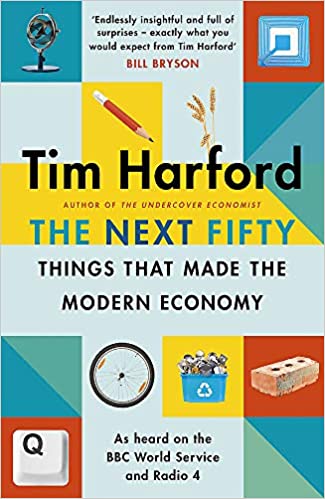Book: The Next Fifty Things that Made the Modern Economy
Author: Tim Harford
Publisher: The Bridge Street
Price: Rs 699
This book is a sequel to Fifty Things that Made the Modern Economy. Tim Harford puts together a collection of 51 things, from the very simple to the extremely complex, that shape our lives in more ways than we are aware of. The book begins with the humble wooden pencil’s history and moves on to that of bricks and bicycles — things we often forget about. Yet they affect our lives in a wide variety of ways and contribute to the functioning of the economy. For instance, the graphite pencil was enormously useful to engineers and draftsmen precisely because drawings made from these pencils could be easily erased.
To take one example, the chapter on “Bicycles” begins with two frightened Americans in 1865 rushing into a tavern and claiming that they had just seen the ‘devil’ — with a human torso and head but a strange lower body part. The ‘devil’ walked a few minutes later into the tavern. The man was a French engineer named Pierre Lallement, who had a two-wheeled contraption without brakes that had led him to fall down a hill at dusk, frightening the daylights out of the two horsemen. The same contraption evolved into the bicycle. It helped develop faster communication methods, and there was a demand for smoother roads. Women felt liberated in the sense of being able to travel alone without a chaperone. It is claimed by historians of the bicycle that it changed the way women dressed (creating a huge uproar in conservative male circles) and caused a diversity in the human gene pool since women and men could get away from their immediate neighbourhoods and meet and get married. Now, of course, cycling is considered to be a good form of exercise and a method of transportation that is free of pollution.
Some of the things described are ambiguous in their social usefulness but are immensely popular. The credit card is a good example of liberating transactions from liquid cash. It works on trust: social trust. Previously, trust was a bilateral bond between two individuals. The credit card helped transcend that restriction. The cards, to be useful, require a large number of retailers who are willing to avail of this method of purchase as well as a large number of consumers who are willing to use it. A critical mass is required on both sides.

The Next Fifty Things that Made the Modern Economy by Tim Harford, The Bridge Street, Rs 699 Amazon
In 1958, Bank of America put a credit card with a $500 limit in 60,000 mail-boxes in Fresno, California, as an experiment. Some used the card and paid; a lot of cards were stolen and misused. Bank of America swallowed its losses and retained faith in the instrument’s ability to boost business. By 1960, Bank of America had one million card-holders. Credit cards, while being a great facilitator of business, are also a great temptation for people to overspend and then land in a financial mess. Interestingly, the author points out that 9 out of 10 Americans believe that credit cards set too liberal credit limits for consumers. However, everyone believes that their own limits are fair and fine.
There were unintended consequences too. The Germans wanted to observe their bombs and missiles being launched from a distance, without getting hurt. The device that was made later evolved into the CCTV (closed circuit television) — the embryonic Big Brother. Now we have machines that perpetually listen to and see whatever we do, store our personal data, use them for profit, and do not give us any access to the data. We seem happy though. We pay for the device. We order an Alexa: the ultimate metaphor of modernity.
The book makes for easy reading when you have nothing else to do; like waiting for a Covid-test result to arrive.











